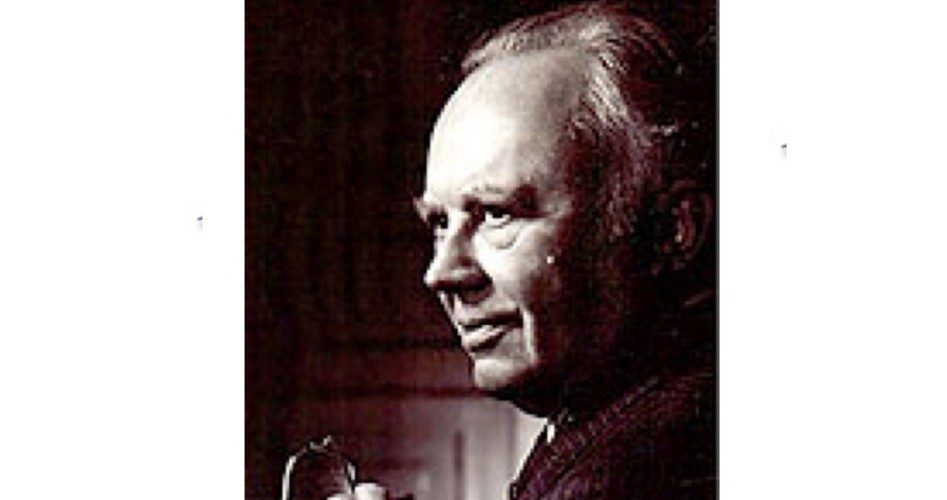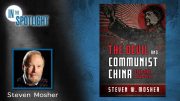
Surviving another season of partisan contention and the banalities which attend the posturing of those who seek elected office can whet one’s appetite for reflection on the “Permanent Things.” The discourse of modern politicians is often a dubious amalgam of unctuous platitudes and shameless fearmongering. Instruction in the principles that form the bedrock of the American Republic, and having occasion to dwell on the life and work of a man who devoted his labors to a spirited defense of the same, is the tonic which is needed at this time.
John M. Pafford, professor emeritus of history and philosophy at Northwood University (Midland, Michigan), has written a book on the life and thought of Russell Kirk that draws on his friendship and personal study with Dr. Kirk, as well as lengthy reflection on Kirk’s published works. (Pafford earned his doctorate in conjunction with his studies with Kirk in the late 1970s and early 1980s.)
Pafford’s volume is entitled simply Russell Kirk, on account of its inclusion in the series Major Conservative and Libertarian Thinkers. The relative brevity of Russell Kirk belies the importance of Pafford’s book, because it constitutes a significant addition to that series. In fact, it is difficult to chart the course of 20th-century American Conservatism without an understanding of Kirk’s influence. The recent release of this volume in a paperback edition also makes it accessible to individuals, and not only institutions. (The original, hardcover edition was released in 2010 at the stultifying price of $140.)
Pafford’s book is but the latest contribution to a slowly growing body of scholarship that has been published in the 20 years since Kirk’s death in 1994. In addition to two important biographies by W. Wesley McDonald (Russell Kirk and the Age of Ideology) and James E. Person, Jr. (Russell Kirk — A Critical Biography of a Conservative Mind), the Intercollegiate Studies Institute published The Essential Russell Kirk in 2007 and a new bibliography of Kirk’s writings in 2011. Gerald Russello also wrote The Postmodern Imagination of Russell Kirk, which was published in 2007.
Of all of the biographies published to date, Pafford’s Russell Kirk is arguably the most accessible for readers who were not previously familiar with writings of the man whose friends and acquaintances fondly referred to him as “the benevolent sage of Piety Hill” and the “wizard of Mecosta.” Pafford’s book is clearly intended to serve as an introduction for college-age scholars, but it is written in such a way that it offers a worthy contribution to the overall study of Kirk’s thought.
Although Russell Kirk has been published in a series devoted to Major Conservative and Libertarian Thinkers, Pafford does not shy away from an extended treatment of Kirk’s contentions with both libertarians and neoconservatives. In point of fact, Pafford believes that Kirk is of particular value to the latest generation of conservatives precisely because of the clarity of his thought in charting a way through the current conservative “identity crisis”:
Conservatism at present and in recent years has been slogging its way through an intense identity crisis. On the one side stand Russell Kirk and those of his persuasion who focus on the Christian rooted permanent things. Opposed to them is a libertarian tinged movement, looking to reason rather than to revelation and applying the laissez-faire principle to personal lifestyle choices as well as to economics. These sides can come together on some issues such as the advocacy of limited government and market economics, but diverge sharply on foundational beliefs. Cooperation on these matters and common opposition to the imposition of a liberal establishment to some extent has masked the severity of the differences. But, cultural matters such as abortion, pornography, and gay issues about which there was a prevailing consensus of disapproval expressed in law, are becoming more and more controversial as advocates for them are pushing for society approval.
The heart of Pafford’s book consists of four chapters: “The Life of Russell Kirk,” “Russell Kirk’s Beliefs,” “Reception of His Writings,” and “The Relevance of Kirk.” The first major chapter, “The Life of Russell Kirk,” is cursory, but sufficient for this volume. (Those who wish to read a more extended examination of Kirk’s life are best served by first reading his posthumously published autobiography, The Sword of Imagination.) The last two chapters serve as an introduction to the critical literature which has arisen surrounding Kirk’s writings. The longest chapter — “Russell Kirk’s Beliefs” — offers a very helpful introduction to the whole pattern of Kirk’s thought, and is augmented by a judicious use of quotations from Kirk’s various books and articles, without giving the sense of being simply a catena of quotations.
While discussing “Russell Kirk’s Beliefs,” Pafford addresses several misunderstandings of the origins of Kirk’s thought, including the important place of Christian theology in the ongoing development of his views. Thus, for example, Pafford replies to critics who have failed to understand the degree to which Kirk matured as a Christian thinker over the course of decades. Pafford responds to several such critical evaluations, and offers pithy citations from Kirk’s writings that illustrate the depth and character of his beliefs, and then concludes by observing:
Although Kirk was not a systematic theologian nor a Catholic apologist, he did believe Christian verities were the foundation of Western Civilization, but he did not stop there; to that was added a deep personal faith, something insufficiently recognized by many who have sought to understand him. The record is there to be discovered by those who probe, especially his works after the 1960s. His philosophy did not change after The Conservative Mind of 1953, but his Christian underpinning grew progressively stronger.
As Pafford notes, it was precisely his Christian convictions that preserved Kirk from despair when he contemplated the sad state of affairs in the American Republic. For those (including this reviewer) who had the opportunity for private conversation with Russell Kirk during the later years of his life, one easily found that there was a manifest harmony between his personal conversation and his writings with regard to the hope which springs from faith in the Christian verity. Kirk’s vision of Conservatism has no place for the godlessness of the modern European “New Right/Nouvelle Droite” — a movement that owes more to Friedrich Nietzsche than to Edmund Burke. Kirk’s appeal for patience and perseverance in one’s Christian and conservative principles is a unifying theme of Pafford’s work. The six “Conservative canons” set forth in The Conservative Mind continue to provide a succinct summary of conservative principles, while the pattern of Kirk’s overall thought inculcates a sense of one’s place within a continuity of a tradition of conservative thought stretching back to early contentions with pernicious ideologies which have erupted time and again throughout the Modern Age. In Pafford’s words:
The implementation of all Kirk taught requires maturity and seriousness of purpose for us in Western Civilization. It is all too common for people either to go their own individual ways, gratifying themselves apart from consideration of deeper matters or to want everything spelled out and nailed down for them. Kirk was aware of these tendencies, but, although sometimes discouraged by events, never was controlled by despair; he knew that in God’s good time truth and right would triumph.
Attention to the “Permanent Things” may not have the drama of the spectacle of the political arena, but when conservatives draw from the deep well of that tradition, they are of vastly greater aid to the preservation of the American Republic.
John M. Pafford, Russell Kirk, (New York, London: Bloomsbury, 2013). Paperback. ISBN 978-1441165572. 166 pages. $29.95.



